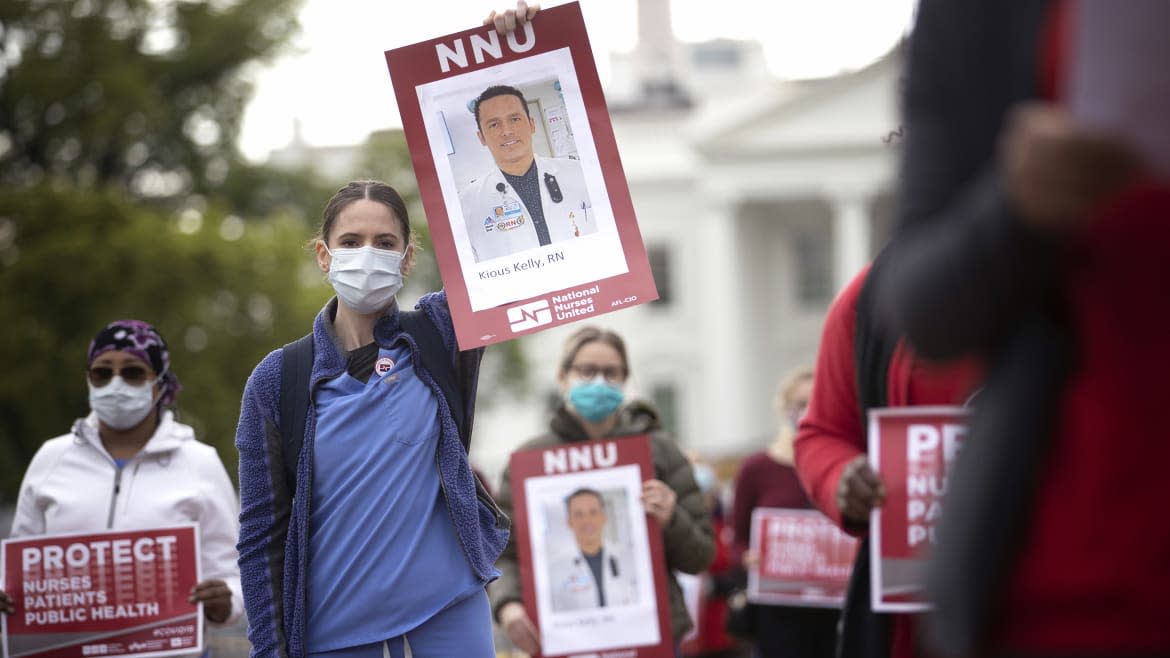Dozens of Nurses Have Died of COVID-19. The Rest Are Still Forced to Reuse Masks.

Nearly three months into the coronavirus pandemic, and despite the deaths of more than 100 nurses from COVID-19, the majority of U.S. nurses say they are still not getting adequate protective equipment.
A survey of nearly 23,000 nurses, conducted by National Nurses United between April 15 and May 10, found a whopping 87 percent were still having to reuse single-use respirator masks with COVID-19 patients. More than a quarter had to reuse “decontaminated” masks—a new and relatively unstudied practice that has been proven to work for only a limited amount of time.
On top of this, just 16 percent of nurses surveyed said they had ever been tested for the virus, despite the fact that nearly three in four had treated a suspected or confirmed COVID-19 patient with their skin or clothing exposed.
“The richest country in the world will call nurses heroes without even bothering to invest in mass producing N95 respirators and other equipment to keep nurses alive,” Bonnie Castillo, the executive director of NNU, said in a statement. “Nurses signed up to care for their patients. They did not sign up to die needlessly on the front lines of a pandemic.”
Nurses Have Been Complaining for Weeks About Inadequate PPE. Now They’re Suing.
The survey results mirror those of smaller questionnaires, like one circulated by the North Carolina Nurses Association earlier this month to its members. Nearly 45 percent of nurses who responded said their hospital did not have enough PPE, and more than a quarter said the situation was worse than it was a month ago, according to results shared with The Daily Beast.
A lack of personal protective equipment (PPE) has been a problem for frontline healthcare workers from the beginning of the crisis. The pandemic—and the interruption to global supply chains—exacerbated an existing shortage of gloves, gowns, and respirator masks, leaving some healthcare workers to buy their own equipment or even fashion it out of household items. In March, nearly half all U.S. healthcare facilities reported being out or almost out of respirator masks.
As more states move toward reopening, and hospitals start expanding the types of procedures they’re willing to perform, some nurses fear the situation will only get worse. Hospital workers told The Daily Beast earlier this month that they were still fighting for basic supplies like sanitizing wipes, even as their hospitals moved to expand the number of admitted patients.
Hospitals Are Restarting Elective Procedures. Workers Say They Aren’t Ready.
Governors, meanwhile, have said they feel hamstrung by a lack of testing when trying to reopen their states.
Despite this, President Trump has continued to claim the U.S. has a “tremendous” supply of PPE and more than enough COVID-19 tests. At a White House event honoring first responders earlier this month, Trump contradicted the president of the American Association of Nurse Practitioners when she said that PPE supplies had been “sporadic,” saying: “Sporadic for you, but not sporadic for a lot of other people.”
Trump invoked the Defense Production Act in early April to speed up production of respirator masks, but it is unclear how effective the move has been. On multiple occasions, the White House gave production contracts to companies with no background in medical supplies—including a $55 million contract for N95s to a tactical training company. A White House task force on the issue was also reportedly hampered by inexperienced volunteers and requests for personal favors from the president’s Fox News friends.
In a press release, NNU called on Trump to implement “immediate protective measures” to prevent further risk to nurses.
“Our message to employers and the Trump administration is: Platitudes are empty without protections,” Castillo said. “For our sake, for the public’s sake—give us PPE.”
Get our top stories in your inbox every day. Sign up now!
Daily Beast Membership: Beast Inside goes deeper on the stories that matter to you. Learn more.

